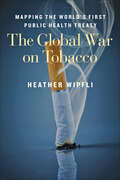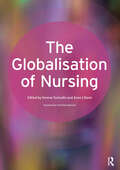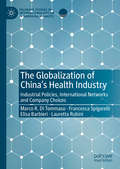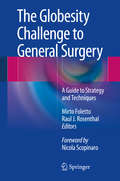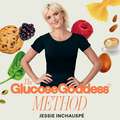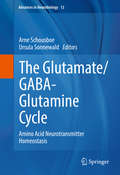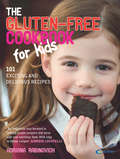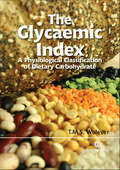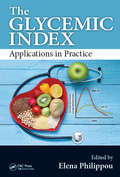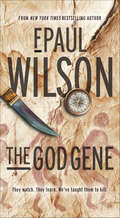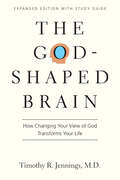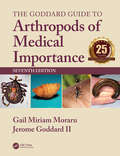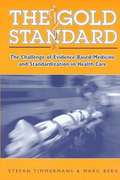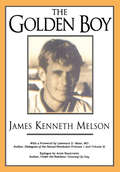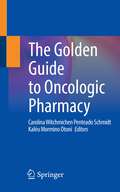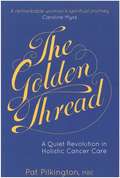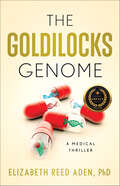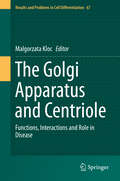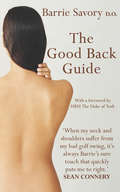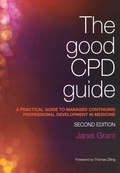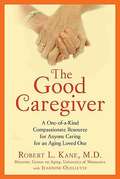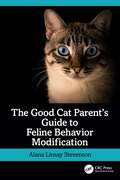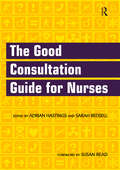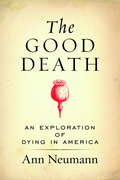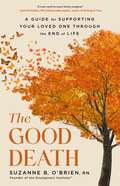- Table View
- List View
The Global War on Tobacco: Mapping the World's First Public Health Treaty
by Heather Wipfli“A major contribution not just to tobacco control research but also to research on global governance and public health . . . thorough [and] compelling.” —Frank J. Chaloupka IV, Institute for Health Research and Policy, University of Illinois–ChicagoAs the era of globalization progressed, the tobacco industry capitalized on its elements—including trade liberalization, foreign direct investment, and global communications—to expand into countries where effective tobacco control programs were not in place. As a consequence, tobacco became the leading cause of preventable death in the world, killing more people each year than HIV, malaria, and tuberculosis combined.In the mid-1990s, a committed group of public health professionals and institutions sought to challenge the tobacco industry’s expansion by negotiating a binding international law under the auspices of the World Health Organization. The WHO Framework Convention on Tobacco Control (FCTC)—the first collective global response to the causation of avoidable chronic disease—was one of the most quickly ratified treaties in United Nations history. In The Global War on Tobacco, Heather Wipfli tells the engaging story of the FCTC, from its start as an unlikely civil society proposal to its enactment in 178 countries as of June 2014. Wipfli also reveals how globalization offers anti-tobacco advocates significant cooperative opportunities to share knowledge and address cross-border public health problems.The book—the first to delve deeply into the origin and development of the FCTC—seeks to advance understanding of how non-state actors, transnational networks, and international institutionalization can impact global governance for health. Case studies from a variety of diverse high-, middle-, and low-income countries provide real-world examples of the success or failure of tobacco control. Written with public health professionals and students in mind, The Global War on Tobacco is a fascinating look at how international relations is changing to respond to the modern global marketplace and protect human health.
The Globalisation of Nursing
by Anne Davis Verena TschudinGlobalisation affects health, health care and nursing and has the potential to change the very nature of what we now take for granted in health care and how we obtain it. Nursing as a profession faces multiple challenges, many of them because of globalization. Nurses have always seen their profession as a passport to the world. In the past, the mov
The Globalization of China’s Health Industry: Industrial Policies, International Networks and Company Choices (Palgrave Studies of Internationalization in Emerging Markets)
by Francesca Spigarelli Marco R. Di Tommaso Lauretta Rubini Elisa BarbieriThis book explores the ongoing transition of China’s economy by examining how its healthcare industry is growing and changing. The coronavirus pandemic has reinforced one of the authors' key points: in our complex, fragile, and interconnected societies, the production of health is a vital strategic ‘industry’. The case of China is particularly salient, because of its economic and geopolitical significance, and the scale of the healthcare challenge it has faced. Adopting a multi-level perspective, the authors examine the entrepreneurial role of the Chinese government as it seeks to strengthen the competitiveness of domestic firms. They analyze the strategies employed to improve China’s technology and capacity for innovation, and discuss China’s strategies and policies to ensure knowledge acquisition and creation in the long-term, with particular reference to international scientific collaborations. This book is a must-read for students, researchers, and policymakers interested in the prospects and challenges posed by the growth of the Chinese healthcare industry and its global impact.
The Globesity Challenge to General Surgery
by Mirto Foletto Raul J. RosenthalThe increasing prevalence of morbid obesity has led the World Health Organization to coin the descriptive term "globesity" to reflect the worldwide nature of the problem. Providing health care to these patients, especially when surgery is required, can be extremely challenging owing to the specific needs in respect of logistics, facilities, and professional expertise. Appropriate care has to date often been unachievable and unaffordable outside of established bariatric centers, but such centers themselves usually have insufficient capacity and resources to cope with the demand among the general population. This book therefore provides a wealth of guidance and helpful tips and tricks on how to deal with obese patients within a general surgery setting. Importantly, it highlights the need for global rethinking on public health as regards resource allocation and patterns and standards of care, with the ultimate goal of improving outcomes through greater affordability.
The Glucose Goddess Method: Your four-week guide to cutting cravings, getting your energy back, and feeling amazing. With 100+ super easy recipes
by Jessie Inchauspé'A must for anyone who wants to understand their body and improve their health'Professor Tim Spector'A food revolution'Daily MailJessie Inchauspé is a biochemist, author and founder of the Glucose Goddess movement (2 million followers on Instagram). With her first book Glucose Revolution, a no. 1 international bestseller, she started teaching everyone about the importance of blood sugar and easy hacks to manage it.In The Glucose Goddess Method, she offers a four-week step-by-step plan to integrate simple, science-proven strategies for steadying your blood sugar into your everyday life. It comes complete with 100+ delicious recipes, an interactive workbook and lots of tips and advice from the Glucose Goddess community on how to stay on track.This Method has been used by thousands to regulate their glucose, and the results are astonishing. You will gain boundless energy, curb your cravings, clear your skin, slow your ageing process, reduce inflammation, rebalance your hormones, improve your mood and sleep better than you have ever done before. You will create positive new habits for life. The best part? You won't be counting calories, and you'll eat everything you love.'Jessie's tips have been a lovely addition to my daily routine.' Davina McCallPLEASE NOTE: When you purchase this title, the accompanying PDF will be available in your audio library along with the audiobook.(P)2023 Simon & Schuster Audio
The Glutamate/GABA-Glutamine Cycle
by Arne Schousboe Ursula SonnewaldFundamental biochemical studies of basic brain metabolism focusing on the neuroactive amino acids glutamate and GABA combined with the seminal observation that one of the key enzymes, glutamine synthetase is localized in astroglial cells but not in neurons resulted in the formulation of the term "The Glutamate-Glutamine Cycle. " In this cycle glutamate released from neurons is taken up by surrounding astrocytes, amidated by the action of glutamine synthetase to glutamine which can be transferred back to the neurons. The conversion of glutamate to glutamine is like a stealth technology, hiding the glutamate molecule which would be highly toxic to neurons due to its excitotoxic action. This series of reactions require the concerted and precise interaction of a number of enzymes and plasma membrane transporters, and this volume provides in-depth descriptions of these processes. Obviously such a series of complicated reactions may well be prone to malfunction and therefore neurological diseases are likely to be associated with such malfunction of the enzymes and transporters involved in the cycle. These aspects are also discussed in several chapters of the book. A number of leading experts in neuroscience including intermediary metabolism, enzymology and transporter physiology have contributed to this book which provides comprehensive discussions of these different aspects of the functional importance of the glutamate-glutamine cycle coupling homeostasis of glutamatergic, excitatory neurotransmission to basic aspects of brain energy metabolism. This book will be of particular importance for students as well as professionals interested in these fundamental processes involved in brain function and dysfunction.
The Gluten-free Cookbook for Kids
by Adriana RabinovichHaving to follow a gluten-free diet can be a daunting prospect for children and young adults - they feel isolated at a time when their friends are enjoying everything from bread, pizza and pasta, to crisps, cakes and biscuits. Yet with supermarkets now stocking many gluten-free ingredients, you can make versatile, healthy and enticing gluten-free meals that will appeal to all the family. Based on recipes created for the author's own daughter, The Gluten-free Cookbook for Kids includes: Over 100 recipes from crispy chicken nuggets and quick pizza to birthday cupcakes and peanut butter cookies; Top Ten kids' favourite dishes; A list of store cupboard essentials; Creative ideas for special treats, healthy snacks and lunchboxes; Top tips for eating out, travelling and school trips. The Gluten-free Cookbook for Kids will solve many of your mealtime dilemmas and help your child to learn what they can and can't eat. An essential guide for any gluten-free family.
The Glycaemic Index: A Physiological Classification of Dietary Carbohydrate
by Thomas M. S. WoleverThe glycaemic index (GI) is a measure of the ability of a food to raise blood sugar. Written by one of the co-inventors of the term, this is a clear and balanced review of current knowledge on this controversial concept. The book explores all the key issues of the definition of the GI, how to measure the GI of a food, how to apply GI information to meals and diets, the reasons why foods have different GI values and the impact of altering a diet GI on health and disease. The book highlights the benefits and the problems surrounding the GI concept, while encouraging readers to think critically about the issues involved.
The Glycemic Index: Applications in Practice
by Elena PhilippouIn 1981, David Jenkins, Thomas Wolever, and colleagues introduced the concept of the glycemic index (GI) to differentiate carbohydrates based on the rate of blood glucose rise following their consumption. Although GI was first used in diet therapy for diabetes, research evidence has accumulated since then to thousands of publications from all over the world with applications for prevention and/or management of many diseases, as well as effects on physiological states and exercise. The Glycemic Index: Applications in Practice has gathered together, in an unbiased and critical way, all the evidence and research on GI, including diabetes, cardiovascular disease, cancer, obesity, polycystic ovary syndrome, pregnancy outcomes, sports performance, eye health, and cognitive functioning. It provides a detailed explanation on how to correctly measure a food’s GI, how the GI of food products can be altered, as well as the use and misuse of GI labelling around the globe. The contributors are either pioneers or experts in the area of GI from all around the globe, including Australia, Canada, Europe, and the United States. The book is a valuable source of information for healthcare professionals of various disciplines, nutritionists, dietitians, food scientists, medical doctors, sports scientists, psychologists, public health (nutrition) policy makers, and students in these fields, as well as an important addition to university libraries.
The God Gene: A Novel (The ICE Sequence #2)
by F. Paul WilsonA genetic discovery unearths a devastating secret in the New York Times–bestselling author’s medical thriller “worthy of Michael Crichton” (Publishers Weekly).When Rick Hayden’s brother Keith disappears, he turns to medical examiner Laura Fanning to help find him. An NYU zoologist, Keith had been researching the so-called “God Gene” that played a key role in human evolution—specifically in the development of brain power and creativity. But after an exciting discovery in East Africa, Keith destroyed his results and vanished.Rick and Laura’s search takes them to an uncharted island in the Mozambique Channel, where they come up against a world-shattering secret—and powerful enemies who have their own devious plans for it. In The God Gene, F. Paul Wilson continues his mind-bending ICE trilogy that began with Panacea.
The God-Shaped Brain: How Changing Your View of God Transforms Your Life
by Timothy R. JenningsWhat you believe about God actually changes your brain. Brain research in neuroscience has found that our thoughts and beliefs affect our physical, mental, and spiritual health. Mind and body are interrelated, and we are designed for healthy relationships of love and trust. When we understand God as good and loving, we flourish. Unfortunately, many of us have distorted images of God and mostly think of him in fearful, punitive ways. This leads us into unhealthy patterns of self-defeating behaviors and toxic relationships. But our lives can change when God renews our minds with a truer picture of him. Psychiatrist Tim Jennings unveils how our brains and bodies thrive when we have a healthy understanding of who God is. He dispels common misconceptions about God and shows how different God concepts affect the brain differently. Our brains can adapt, change, and rewire with redeemed thinking that frees us from unnecessary pain and suffering. Discover how neuroscience and Scripture come together to bring healing and transformation to our lives. This expanded edition now includes a study guide for individual reflection or group discussion, with questions for learning from Scripture, science and nature, and experience.
The Goddard Guide to Arthropods of Medical Importance
by Gail Miriam Moraru Jerome Goddard IICovering all major arthropods of medical importance worldwide, this award-winning resource has established itself as a standard reference for almost 25 years. With the globilization of commerce and the world becoming more intimately connected through the everyday ease of travel, unknown arthropod species are being increasingly encountered. This means access to up-to-date, authoritative information in medical entomology has never been more important. Now in its seventh edition, this book maintains its well-acclaimed status as the ultimate easy-to-use guide to identify disease-carrying arthropods, the common signs and symptoms of vector-borne diseases, and the current recommended procedures for treatment. Includes an in-depth chapter with diagnostic aids to help physicians to recognize and accurately diagnose arthropod-related diseases and conditions more easilyUpdates all chapters with the latest medical and scientific findings, including Zika virus, red meat allergy, new viruses found in ticks, and vaccine development for malaria and dengue feverPresents a greater medical parasitology emphasis throughout Offers electronic downloads containing additional photographs of arthropod-caused diseases and lesions, as well as instructional videos with pest identification aids, basic entomology, and insect and pest ecology.Illustrated throughout with detailed color images to aid identification, The Goddard Guide to Arthropods of Medical Importance, Seventh Edition will remain an essential guide for physicians, public health officials, and pest control professionals.
The Gold Standard: The Challenge of Evidence-Based Medicine and Standardization in Health Care
by Berg Timmermans Stefan MarcFew things make people react more strongly to the changes going on in health care than the word standardization. Critics shudder at the mindless sameness of standards, while supporters dream of a world in which standardized "best practices" open up a world of efficient health care delivery. The Gold Standard takes up this debate to investigate the real meaning of standardization and how it affects patients, doctors, and the institution of medicine. Showing that standards are not about less or more skills, or more or less uniformity, but rather about a redefinition of autonomy, patients, and relationships, Timmermans and Berg show instead that they are about creating new worlds of medical treatment. Cutting through the hype and fears, the authors show where the true powers of standardization lie. The Gold Standard will become a classic for students of medicine and health care policy, and will be a welcome book for anyone concerned with the future of our system of care.
The Golden Boy
by Robert HatchThis is the first autobiography to be published by The Haworth Press.This is the first autobiography to be published by Harrington Park Press.The place is New York City. The time is the decade before the plague of AIDS. Thousands of gay men were living a free-wheeling lifestyle of club hopping, “score” hunting, sex without fear, and upward mobility. To none did The Big Apple offer greater rewards than to those young men who had the envied “male model” look.Author James Melson belonged to this exclusive clique: he was tall, blond, muscular, and very “straight looking.” He was a model at 19, and by 25, was a highly successful Wall Street banker. His good looks offered him immediate entry into exclusive clubs and onto the sexual fast track with actors, male models, and other members of the “Clique.”The author brings you behind the scenes into the lifestyle of the handsome “Clique”--providing details of the vigorous and entertaining excitement of the times. He exposes--for one of the few times in print--the lesser-known attitudes of the “Clique” and their disdain for “ugly faggots,” their obsession with strictly the chic and glamorous, and the fast lane life of partying and sex.For 200 pages, the reader is brought back to the era that for many older readers is just a memory, and for younger readers a time they never knew--when to be a “Golden Boy” was to be a prince, and sex was only fun and games.The Golden Boy autobiography ends when the author is diagnosed with AIDS, abandoned by a lover and friends, and left to look back on his life with a growing perspective.The role of “good looks” and people with AIDS is rarely talked about, particularly by gay survivors whose lesser appeal was once perhaps a curse but then ultimately their saving grace. This is not just another AIDS autobiography but a document dealing indirectly with this fact of life. The autobiography is introduced by Larry Mass, MD, an internationally recognized social historian/physician who examines the “Culture of Narcissism” in that era. Arnie Kantrowitz then presents an astonishingly frank and perhaps shocking Epilogue which will have many readers wanting to re-read the book.
The Golden Guide to Oncologic Pharmacy
by Carolina Witchmichen Penteado Schmidt Kaléu Mormino OtoniThis book fills an important gap in the professional’s daily practice of both Oncology and Hematology. From the understanding of oncological and hematological diseases, drugs and protocols, to the administration of an oncology pharmacy, this book is an essential guide to supporting health professionals working or that intend to work in this area. This golden standard to practice is featured as a pocket guide easy to be carried around the hospital or clinic. The chapters cover topics such as support drugs; immunotherapy; CART-cells; chemotherapy for rheumatology, surgery and ICU; tumor lysis; extravasation; adverse effects; and stem cell transplantation. The content gathered in this volume is an invaluable resource not only to oncologic, clinical and hospital pharmacists, but also residents, postgraduate and undergraduate students.
The Golden Thread: A Quiet Revolution in Holistic Cancer Care
by Caroline Myss Felicity Biggart Pat PilkingtonPat Pilkington was co-founder of the Bristol Cancer Help Centre, the first charity to offer a truly holistic approach to cancer care. In this memoir, completed when she knew she was approaching death, Pat tells her story; starting with her childhood, through the early days of the Centre to its growth into Penny Brohn Cancer Care, the globally influential institution it is today. Above all, she shares her own spiritual journey, her deep exploration of faith, love, and what lies at the core of each human life and each human death. She speaks to life, not just to cancer, and shows how the restoration of the human spirit is an essential part of holistic healing. The Golden Thread of the title is the transcendent nature of love that runs though everything, awakening the potential to uplift, inspire, overcome and create anew, even in the face of severe adversity.
The Goldilocks Genome: A Medical Thriller
by Elizabeth Reed AdenWhen San Francisco–based FDA epidemiologist Dr. Carrie Hediger uncovers a rash of unexplained deaths while investigating the suspiciously convenient death of her best friend, she becomes determined to find answers—even if it leads her to a murderer, and even if confronting authority, using her wiles, and bending the rules to get justice risks her future in the FDA. To unravel the puzzle, Carrie assembles a team: some talented post-doctoral fellows, a quirky pharmacologist, an unctuous chemist, and a skeptical FBI agent that she can’t help her attraction for. Together, they follow the data through the twists and turns, eventually uncovering that the Goldilocks effect in prescription drugs—the premise that people are inclined to seek “just the right amount” of something—is central to understanding these mysterious deaths. Through the twists and turns, Carrie and her team enter a race to uncover the truth . . . and catch a killer. Grounded in real data analysis techniques, real science and pharmacology, and actual current psychiatric practices, The Goldilocks Genome is simultaneously a taut, race-against-time thriller and a condemnation of the psychiatric industry’s failure to implement genetic-based “personalized medicine”—a problem that persists to this day.
The Golgi Apparatus and Centriole: Functions, Interactions and Role in Disease (Results and Problems in Cell Differentiation #67)
by Malgorzata KlocThis volume takes a closer look how the cell organelles Golgi apparatus (also known as the Golgi complex or Golgi body), and centriole are structurally and functionally intertwined.Initially, it was believed that the role of Golgi complex is limited to the packaging and preparation for secretion of various cellular proteins, while the centriole participates in cell division and cilia formation. However, since their discovery nearly 200 years ago, it became clear that these two organelles are interacting, and that their functions are much more complex and far reaching than previously thought. Recent findings indicate that the Golgi–Centriole relationship may be important for directional protein transport, cell polarization and cell cycle progression. Current studies indicate that Golgi and centriole also participate in development and act as cellular and immunological sensors, and that their abnormalities lead to cell and developmental abnormalities, Alzheimer, cancer, various lipid disorders and neurological and immunological diseases in humans. This volume combines the latest information on the structure, molecular composition, and roles of Golgi and centriole in various cellular functions and diseases. The better understanding of the Golgi–centriole interactions may lead to the development of novel therapies for the treatment of various diseases, including cancer.
The Good Back Guide
by Barrie SavoryMore than 60% of the UK's population report regular back pain with the amount of working time lost, in the region of 119 million days a year. Not everyone has the time - or money - to visit chiropractors or osteopaths. Barrie Savory is one of Britain's leading osteopaths and draws on his many years of research, teaching and practise to provide an easy to follow guide to how we can all protect our backs and, if the damage has already been done, treat injuries and prevent further strain.Savory looks at the way in which we, as human beings, put our bodies through a series of potentially harmful positions as we go about our daily lives - from the way we get out of bed in the mornings, travel to work, sit at our desks, carry our shopping, watch TV - not to mention injuries through sex. Full of advice on diet, exercise, posture and relaxation, this guide is also packed with exercises that can be performed safely and easily at home to treat strains and injuries.
The Good CPD Guide: A Practical Guide to Managed Continuing Professional Development in Medicine, Second Edition
by Janet GrantThe role of continuing professional development (CPD) is increasingly crucial for regulators, educationalists and the healthcare profession. In terms of continued fitness to practise and patient safety, as well as maintaining professional standards, a more thoughtful, evidence-based and transparent approach should be considered. This book provides a concise overview of the literature whilst drawing on doctors' experiences, offering a practical approach to managing CPD. The systematic method ensures the interests of the service and regulators are met whilst enhancing the importance of high quality patient care and the needs of doctors as individuals. It focuses on the following key aspects: Relating CPD to the needs of the changing and developing health care service
The Good Caregiver
by Robert L. Kane Dr.A survival guide with an insider's perspective, for the millions of unprepared caregivers of aging loved ones. As Americans are living longer, an unprecedented number of people now require long-term care during their last years. More than 15 million adult children now care for their elderly parents, and unsuspecting caregivers are usually unprepared financially, emotionally, and practically for the relentless job they will face. In The Good Caregiver, world-renowned expert on aging and long- term care Dr.Robert Kane provides a road map for caregiving. More than just a professional expert, Dr. Kane draws on his personal experience of caring for his aging mother after she struggled from a debilitating stroke. Dr. Kane offers heartfelt advice for those learning how to best care for their loved one and how to make thoughtful, informed decisions at each stage of the caring process: ? How does a nursing home differ from assisted living? ? How is a homemaker different from a home health aide? ? How far can you trust a hospital discharge planner? ? What services does Medicare cover, and much, much more The Good Caregiver equips readers to deal more effectively with the challenges of day-to-day care and to navigate the system itself, including legal, financial, and interpersonal hurdles. Filled with stories and sidebars from other caregivers, The Good Caregiver offers a candid, personal approach to caregiving, providing fearless answers to difficult scenarios with humor and encouragement.
The Good Cat Parent’s Guide to Feline Behavior Modification
by Alana Linsay StevensonCats are cuddly and adorable, but they are often misunderstood. Sadly, many cats are relinquished to shelters or rehomed due to normal behaviors that are incorrectly treated or mishandled. In this book, Elite Fear-Free and Low-Stress Handling Certified author Alana Linsay Stevenson empowers cat parents and teaches them how to address and modify challenging feline behavior.You will begin by learning basic kitten care and feline developmental stages; how cats differ behaviorally from group animals, such as dogs and people; feline body language; and how cats handle stress. Alana provides concise instruction on how to gently handle cats: how to pick up and carry them, acclimate them to carriers, the use of towels, alternatives to scruffing, and how our body language affects cats. Packed with photographs for visual reference, this book offers clear guidelines and easily implementable strategies for resolving feline behavioral problems, such as: failure to use the litter box play aggression petting aggression inter-cat aggression furniture scratching jumping on counters obsessing about food night wailing fear of people aggression to strangers The content is organized by topic for easy access to information, as you need it.The Good Cat Parent’s Guide to Feline Behavior Modification is for anyone who likes cats and wants to learn more about them. Whether you are a veterinary professional, a volunteer or shelter worker who regularly handles stressed cats, or a cat parent who simply wants to understand your cat, you will find helpful and useful information at your fingertips to give cats a better quality of life. No cat parent should be without this book!
The Good Consultation Guide for Nurses
by Sarah Redsell Adrian Hastings Susan ReadThis invaluable guide for nurses improves the skills and knowledge required to consult effectively with patients. It is highly practical, easy to read and comprehend, and is designed for use in daily practice, and as an aid for professional development. The ‘Consultation Assessment and Improvement Instrument for Nurses’ (CAIIN) concept is introduced, and sample forms, suggested strategies and tables containing key information are also provided. The recent substantial changes that have taken place in health service structures, staffing arrangements and nursing practice have led to more nurses working in first contact roles and within nurse-led services. Nurses at all levels in primary and secondary care, including those in pre-registration training will find this guide vital, as will nurses considering taking on autonomous roles such as independent prescribing. It is also highly suitable for nurse lecturers, nurse managers, learning and health service managers, and undergraduate and postgraduate nursing students.
The Good Death
by Ann NeumannFollowing the death of her father, journalist and hospice volunteer Ann Neumann sets out to examine what it means to die well in the United States.When Ann Neumann's father was diagnosed with non-Hodgkin's lymphoma, she left her job and moved back to her hometown of Lancaster, Pennsylvania. She became his full-time caregiver--cooking, cleaning, and administering medications. When her father died, she was undone by the experience, by grief and the visceral quality of dying. Neumann struggled to put her life back in order and found herself haunted by a question: Was her father's death a good death?The way we talk about dying and the way we actually die are two very different things, she discovered, and many of us are shielded from what death actually looks like. To gain a better understanding, Neumann became a hospice volunteer and set out to discover what a good death is today. She attended conferences, academic lectures, and grief sessions in church basements. She went to Montana to talk with the attorney who successfully argued for the legalization of aid in dying, and to Scranton, Pennsylvania, to listen to "pro-life" groups who believe the removal of feeding tubes from some patients is tantamount to murder. Above all, she listened to the stories of those who were close to death.What Neumann found is that death in contemporary America is much more complicated than we think. Medical technologies and increased life expectancies have changed the very definition of medical death. And although death is our common fate, it is also a divisive issue that we all experience differently. What constitutes a good death is unique to each of us, depending on our age, race, economic status, culture, and beliefs. What's more, differing concepts of choice, autonomy, and consent make death a contested landscape, governed by social, medical, legal, and religious systems.In these pages, Neumann brings us intimate portraits of the nurses, patients, bishops, bioethicists, and activists who are shaping the way we die. The Good Death presents a fearless examination of how we approach death, and how those of us close to dying loved ones live in death's wake.From the Hardcover edition.
The Good Death: A Guide for Supporting Your Loved One through the End of Life
by Suzanne B. O’BrienPractical wisdom and holistic planning to ease life's most difficult transition, from an acclaimed hospice nurse, death doula, and end-of-life educator. Many of us have to show up for someone we love at the end of life. Knowing how to do that changes everything. With over twenty years of experience as a hospice nurse, palliative care professional, and founder of the Doulagivers Institute, Suzanne B. O&’Brien, RN has trained more than 350,000 people in what can be done to help the dying person, caregiver and other loved ones so they may move through each stage with as much comfort and ease as possible. In The Good Death, O&’Brien provides a comprehensive plan and the empowering knowledge to make a beautiful, sacred, and profound experience for everyone involved. Through practical advice, emotional support, and expert insights, O&’Brien gently holds your hand through every aspect of the process, including: · Learning how fear of death makes end of life harder, and how we can begin to quell it · Care instructions to ensure your loved one&’s comfort · Support system strategies to avoid burnout as a caregiver To further empower you in facilitating a good death, the second half of the book is presented workbook-style. The Peace of Mind Planner features prompts to initiate important conversations with your loved one about their physical, mental, emotional, financial, and spiritual preferences, and space to record this important information. The planner allows you to be fully present in these last precious moments, and come away with a thorough plan for your loved one&’s end- of- life wishes. With empathy and a careful approach, The Good Death is not only a comprehensive, compassionate, and in-depth resource, it is a beacon of hope and support.
